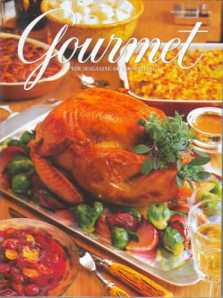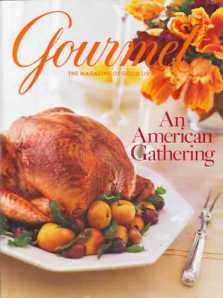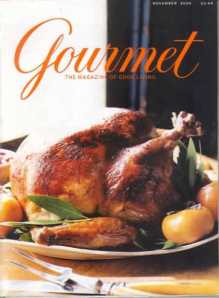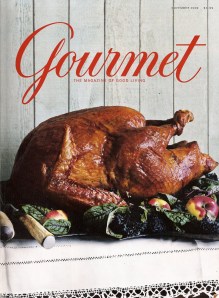Thanksgiving has become my favorite holiday, especially now that I haven’t been able to spend Christmas in Jamaica for several years. The sheer joy of engaging in this ritual feast by preparing foods that are time-honoured favorites makes it very special for me. It’s a ritual that almost every American household is engaging in at the same time. Thanksgiving jumpstarts my holiday cooking routine, which will be punctuated by the Christmas fruit cake and pepperpot on New Year’s day.
Until I got to graduate school, I did not have any real understanding of Thanksgiving. Before that, Thanksgiving was merely a brand new word in my vocabulary. Up to then, it had meant eating dinner at my aunt’s house, which I didn’t exactly look forward to. Otherwise, it was time to begin term papers and to catch up on reading for final exams. Sure, I returned for the grand meal a few times during my college years. But that was because of loneliness – everybody else was gone and I was alone in the dorms, so there was nobody to talk to. It wasn’t because I relished the family get-together and looked forward to seeing family members who I hadn’t seen since the last Thanksgiving holiday. By my senior year, guilt had started to kick in. Since everybody else went home, shouldn’t I at least pretend to want to do the same?
It was during this time that I came to realize that there was an expectation – a strong one – that people traveled back to their homes to spend time with their families. I didn’t want to do that because I didn’t particularly like my family at the time. Later on when I began to hear other people’s horror stories of having to endure this holiday with their families – in fact, I still hear the stories – I began to understand that at least some of the feasting and gluttony taking place all across the United States on that day was really a way to block out undesirable emotions, or compensate for the decided absence of love and acceptance in a houseful of people related by blood and history.
At some point when they had both settled in northern Westchester, my mother and her sister decided to take turns hosting holiday dinners: My aunt took Thanksgiving because it meant she did not work the night before, and had the day to prepare the meal and eat dinner, after which she would leave for work (She was an obstetrical nurse at the county hospital, and worked at nights). My mother got Christmas because she worked on the day shift at the same hospital, and usually requested to have the day off. Since my aunt always worked on Christmas Eve night, she would be too exhausted to cook on Christmas Day. Until my mother retired in 2009, this work/holiday shift had been sustained for over twenty years! My mother and I usually prepared a couple of dishes that I knew I would be able to eat, just in case nothing else was to my liking. Although my grandmother always roasted a turkey at Christmastime in Jamaica, I had not warmed up to the idea of American turkey. I was still laboring under the received notion that 1) Americans cannot cook to save their lives; 2) everything they cook came frozen, out of a can or box and with directions; and 3) they don’t season their food – salt and pepper was the extent of it.
The meal turned out not to be as bad as it could have been, I suppose. But for a long time, these dinners – along with the anxieties of preparing it – were the only impression I had of Thanksgiving: the frozen turkey that didn’t defrost soon enough and was never cooked by the time we got there; the brussel sprouts that were overcooked, soggy and tasteless; the stuffing courtesy of Stouffers; the yams that came out of a can; the signature cranberry sauce which appeared as a red cylindrical gelatinous solid which slid out of the can and plopped into a bowl where it was sliced thickly, and waited to be moved onto somebody’s plate. I kinda liked the cranberry sauce only after I had mashed it up with my fork to disguise the rings molded into its form by the container. I survived off stuffing, whatever dish we brought – usually a ham or curried goat – and the yams, having done a last-minute rescue with pineapple or orange juice, cinnamon, brown sugar and some cornstarch.
Around 1993, while I was in graduate school in Ann Arbor, I went to spend Thanksgiving at Susan and Sandy’s house, otherwise known as “home for wayward lesbians”, which was located in Stockbridge, a small farming town in central Michigan. I was one of several folks there who did not want to spend Thanksgiving with our families of origin. It was here that I had an inkling that Thanksgiving didn’t need to be so canned or overcooked. The turkey was delicious, the cranberry sauce came from real cranberries, which I was seeing for the first time, the desserts were beyond divine. Just good food – well cooked, lots of love, no stress. Actually, I learned a lot from Susan about preparing good food. We were foodies together before there was such a term or identity. Susan was certainly witness to the first time I tried to churn my own butter – not intentionally of course. She asked me to whip the heavy cream for the cherry pie that we were making, but she never told me when to stop. So, butter it became. I make this pie every year now; it’s the official announcement that summer has arrived in our home. I suspect that Susan might have also mentioned Gourmet magazine to me, as one that I might have recipes that I would like. Well, the first Gourmet magazine I picked up in 1996 happened to be the November issue. That was the issue that introduced me to the idea of brining a turkey, and preparing a splendiferous apple pie with a single crust. Until the magazine folded last year, I was a regular reader. And, when my subscription lapsed as it would occasionally, I made sure that, at the very least, I purchased the November issue.
For me, Thanksgiving is a profoundly American holiday. The history in which it is embedded – a rather violent and self-serving one at that – and ongoing efforts to sanitize that history, is what informs the main ingredients of most dinner tables on that day: a turkey, stuffing, green vegetables, corn, squash, cranberries. While these ingredients arrived primarily through successful mass marketing efforts by agro-producers, there is something about the configuration that changes very little. I appreciate that, I really do. That’s tradition: it changes in order to accommodate various tastes and interests, but the meaning remains the same.
Experiencing the regional and ethnic variations in the thanksgiving feast has certainly helped me to accept that I could choose what I included and it would still be my Thanksgiving dinner, not somebody else’s. NPR did a wonderful story last year about the thanksgiving feasts prepared by chefs from various backgrounds.
The best turkey I have ever had – besides mine – was made by my uncle’s then-wife who is from Egypt. I visited them in Virginia in 1993. It was divine: so fragrant and stuffed with an assortment of finely minced vegetables, dates, onions and who knows what else. It was hard to believe that this was the same turkey that was being perennially bad-mouthed.
Then, there’s the turkey prepared by my Haitian family: who knows how Marthe seasoned it, but it came out tasting like — Haitian food. Just enough pepper, a hint of cloves, and served with riz djon djon, lambi, potato salad, pen patate, etc.
At my partner’s family home in the Bronx, the usual suspects appear at this feast: baked chicken, rice and peas, curried goat, roast pork, potato salad, macaroni and cheese, sorrel and rum punch. And sometimes, the turkey.
So far, I have decided not to include any Jamaican dishes in my Thanksgiving dinner. I wanted this meal to be distinct from every other holiday and special event. I also wanted to use it as an opportunity to discover what else America has to offer in the way of food. For this, I choose to harvest from my stack of Gourmet magazines, and garnish the dishes with my own history.
I have to be honest: I feel like Thanksgiving is really a special bonding time between myself, the magazine and my kitchen.
Of course, the dishes I prepare are informed by my own Jamaican cooking style. Thyme, allspice/pimento and ginger are applied quite liberally across the dishes.
Last year, I actually allowed someone to help me prepare the meal: my mother. But usually, I do it all by myself, save a dish or two that specific people choose to make. Mostly, I prepare the dishes from memory. But each year I return to those well-thumbed food-splattered back issues to find one recipe that I had skipped over, had tried once many years ago or never at all.
It will take a long time to exhaust all the variations. After that, maybe I will include a Jamaican dish or two.
This year, I prepared the smallest Thanksgiving meal ever. It was a drastically scaled-back version for three people, and had to be done within two hours. We spent the morning and early afternoon volunteering at the thanksgiving meal for LGBT elderly folks at the Center on Halsted.
This year’s menu:
* roast turkey breast seasoned with thyme/sage/parsley/orange zest/garlic butter
* ham with bourbon gingersnap crust
* butternut squash soup with chicken, carrots & dumplings
* green beans with shallots & figs
* roasted yams in orange juice, ginger & maple syrup
* cornbread/sage/sausage/cherries/walnut stuffing
* pumpkin chocolate tart
* poached pears with brandy
* cranberry cider
* lambrusco bianco
* sparkling apple cider









